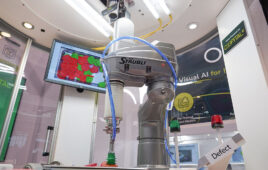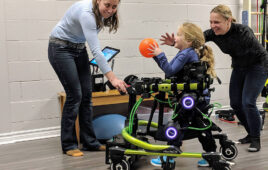|
Listen to this article
|
MassRobotics recently hosted the “Robotics in Age & Assistive Tech” event in collaboration with The Grid and Harvard’s Move Lab. Held at the Harvard Science & Engineering Complex, the event brought together a diverse group of stakeholders to discuss the challenges and solutions in the rapidly growing field of robotics and assistive technology.
This event explored how robots and artificial intelligence (AI) can be leveraged to enhance mobility, independence, and overall well-being for older adults and individuals with physical impairments. The gathering underscored the critical role of collaboration between research institutions, healthcare providers, and innovative startups to create impactful solutions in the age and assistive tech space.
A vision for the future
Before the event’s formal sessions began, participants were given the opportunity to take a tour of Harvard’s Move Lab, led by professor Conor Walsh. The Move Lab is a collaborative space where engineering and design intersect to create functional wearable devices that enhance mobility. Walsh’s insights into the lab’s groundbreaking work highlighted the potential of robots to transform healthcare and rehabilitation processes.

Conor Walsh showing attendees of the “Robotics in Age & Assistive Tech” event around Harvard’s Move Lab. | Source: MassRobotics
Tackling needs and challenges
The event kicked off with presentations on the needs and challenges facing aging and mobility-impaired populations. Keynotes from Indra Sandal and Kevin White of Tampa Veterans Hospital provided insight into the mobility needs of patients in hospital and rehabilitation settings. These experts highlighted how technological innovation is essential to meeting the growing demand for mobility aids and support systems in healthcare facilities.
The AARP’s AgeTech Collaborative, represented by Danielle Duplin, also presented on the specific challenges facing aging populations. Her insights highlighted the importance of developing accessible, affordable solutions that focus on “joy,” and allowing the aging to use tools and technologies that are simple to use and don’t require assistance so that the user feels independent.
Additionally, Michael Bankowski, founder of Prosperous Health, spoke about the critical role of caregivers and the challenges they face. As the population ages, the need for advanced assistive technologies to support both caregivers and those they care for is more pressing than ever.
Cutting-edge research and robots
The event continued with a series of presentations from leading researchers in the field of robotics and assistive technology. Paolo Bonato, director of the Motion Analysis Laboratory at Spaulding Rehabilitation Hospital, shared research from the hospital’s BioRobotics Laboratory that focuses on advances in rehabilitation technology and wearable robotics for patients with mobility impairments.
Kyu-Jin Cho from the BioRobotics Laboratory Seoul National University and Lou Awad from the Boston University Neuromotor Recovery Laboratory also presented their work on wearable devices and neuromotor recovery. Their research demonstrated the transformative potential of wearable robots in helping individuals regain lost mobility and independence.
From research to commercialization: real-world impact

Paul Gudonis, CEO of Myomo, shares how Myomo’s robotic technology is helping patients overcome upper limb impairment. | Source: MassRobotics
The final sessions focused on startup technologies and the commercialization of robotics and assistive technologies. A notable success story was presented by Paul Gudonis, CEO of Myomo, a leader in medical rehabilitation robotics. Gudonis shared how Myomo’s robotic devices are helping patients overcome upper limb impairment, providing hope and independence to individuals who had previously been unable to perform everyday tasks.
A highlight of the event was the Startups Showcase, where 9 robotics startups had the opportunity to pitch their ideas and to the audience. Each company had 3 minutes to share how their technology is contributing to the field of assistive and mobility tech. Startups included:
- Able Innovation (led by Jay Singh), a robotic and automated device operated by a single operator for patient transfer.
- ATDev (led by Todd Roberts), developing a robotic knee brace to support rehabilitation from anywhere
- Ava Robotics (presented by Marcio Macedo), which is designing robots to assist with remote care.
- Cobionix (presented by Matthew Sefati), Autonomous medical robots for healthcare providers
- REEV (presented by Amaury Ciurana), REEV is making the first smart, patient-centric, motorized knee brace for post-stroke walking assistance
- Tatum Robotics (Samantha Johnson, founder and CEO) dedicated to empower the deafblind community with their first independent communication tool
- Tombot (presented by Tom Stevens) robotic pets for people who cannot safely or practically care for their own
- UnOrthoDOKS (led by Danish Shaikh) wearable robotic orthoses for knee rehabilitation
- Verve Motion (presented by Brendan Quinlivan) an agile exosuit for a safe and productive workforce in motion
Looking ahead: collaboration for impact

Tom Stevens showing off Tombot’s robotic pets at the “Robotics in Age & Assistive Tech” event. | Source: MassRobotics
Paul Loschak from Medtronic, a sponsor of the event, wrapped up the session discussing the importance of corporate collaboration in driving innovation. Medtronic’s involvement in the event reinforced the need for industry leaders to work alongside startups, academic institutions, and healthcare providers to create sustainable solutions for aging and mobility-impaired individuals.
Following the presentations, attendees had the opportunity to network and explore startup demos, allowing them to see firsthand the startup’s technologies that are shaping the future of healthcare and assistive tech.
A step toward the future of healthcare innovation
The “Robotics in Age and Assistive Tech” event sparked conversations and collaborations across sectors. As the population continues to age, the need for innovative robotics and AI-driven solutions will only increase. By bringing together healthcare providers, researchers, and tech innovators, MassRobotics, The Grid, and Harvard’s Move Lab are playing a pivotal role in shaping a future where technology empowers individuals with mobility challenges to live fuller, more independent lives.
For those involved in aging and assistive technologies, the event was a reminder of the power of collaboration, innovation, and shared purpose in tackling the challenges that lie ahead.
Editor’s Note: This article was reprinted from MassRobotics and slightly edited for brevity and clarity.






great subject. very interesting